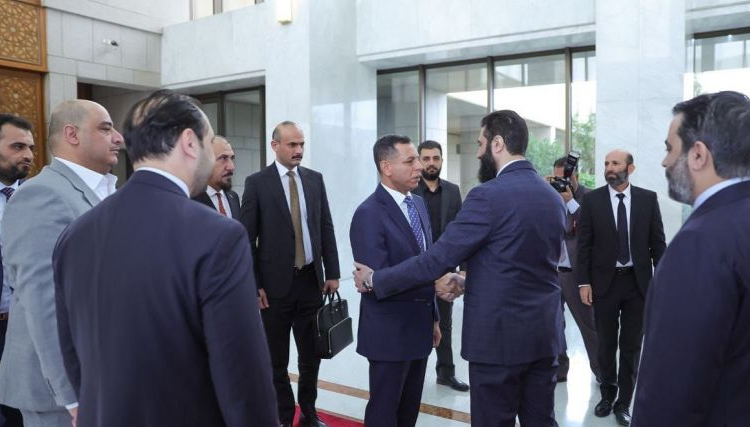Iraqi Security Delegation Arrives in Damascus for Talks on Border Security and Energy Cooperation
By Kardo Roj
DAMASCUS, Syria (North Press) – A high-level Iraqi security delegation arrived in the Syrian capital on Friday to hold bilateral discussions with top Syrian officials on border security, counterterrorism collaboration, and regional trade and energy infrastructure, according to Iraqi media outlets.
The delegation, led by Iraqi intelligence chief Hamid al-Shatri, includes senior representatives from the Interior Ministry’s Border Forces Command, along with officials from the Ministries of Oil and Trade, and Iraq’s Border Ports Authority. The group is scheduled to meet with Syrian President Ahmad al-Shar’a and other key government figures.
The visit underscores intensifying efforts by Baghdad and Damascus to bolster security cooperation along their long and porous shared border, which has historically served as a transit route for militants and smugglers.
The discussions are expected to focus on mechanisms to strengthen border control and prevent potential cross-border threats, particularly from remnants of the Islamic State (ISIS). Both Syria and Iraq continue to face security challenges from sleeper cells and insurgent activity in remote areas—especially in regions adjacent to the Syrian desert and Iraq’s western provinces.
Although Syrian Democratic Forces (SDF) maintain security in much of northeast Syria, the central government retains control over segments of the Iraqi-Syrian frontier, where coordination with Iraqi forces remains crucial.
Security experts suggest that greater intelligence sharing and joint patrols could play a pivotal role in countering transnational militant movements. The inclusion of Iraq’s intelligence service in this round of talks signals a shift toward deeper operational coordination.
Beyond security concerns, the Iraqi delegation is also expected to explore economic cooperation, with a particular focus on reviving an oil pipeline that once connected Iraqi fields to Syria’s Mediterranean ports. Rehabilitating this route could offer Iraq a strategic alternative to current export paths through the Persian Gulf, diversifying its energy transit options amid regional geopolitical uncertainties.
According to Iraqi reports, the delegation will examine the technical and logistical feasibility of restoring the pipeline infrastructure, which was damaged and neglected during years of conflict. Analysts view this initiative as part of a broader Iraqi strategy to assert greater autonomy in energy exports while strengthening ties with neighboring countries.
The inclusion of officials from Iraq’s trade ministry also suggests that talks may cover expanded trade routes and improved customs coordination—efforts that could benefit both economies struggling with the long-term effects of war and sanctions.
The visit takes place amid a gradual realignment of regional diplomatic and security dynamics. Iraq has increasingly positioned itself as a neutral player seeking pragmatic ties with both Western and regional powers. Its renewed outreach to Damascus also reflects shared concerns over border instability and the lingering threat of extremist resurgence.
While the Autonomous Administration of North and East Syria (AANES) and the US-backed SDF have played a significant role in stabilizing large parts of the border zone, the security vacuum in other regions has necessitated renewed bilateral cooperation between Damascus and Baghdad.
The talks are also being closely watched by regional stakeholders, particularly Iran and Russia, who maintain influence in both countries. Observers suggest that successful cooperation between Iraq and Syria could set the stage for broader initiatives aimed at stabilizing the Levant and fostering post-conflict reconstruction.
If the meetings yield concrete outcomes—such as enhanced border monitoring, intelligence cooperation, and progress on the energy corridor—they could mark a significant step in post-ISIS regional security architecture.
For Damascus, these talks represent an opportunity to re-engage diplomatically with Arab neighbors and potentially ease its economic isolation. For Iraq, they signal a desire to assert control over its western frontiers and establish itself as a regional bridge amid shifting alliances.
As Syria continues to navigate a fragmented security landscape, such bilateral engagements—while limited—point to emerging possibilities for coordinated regional security and development strategies.

